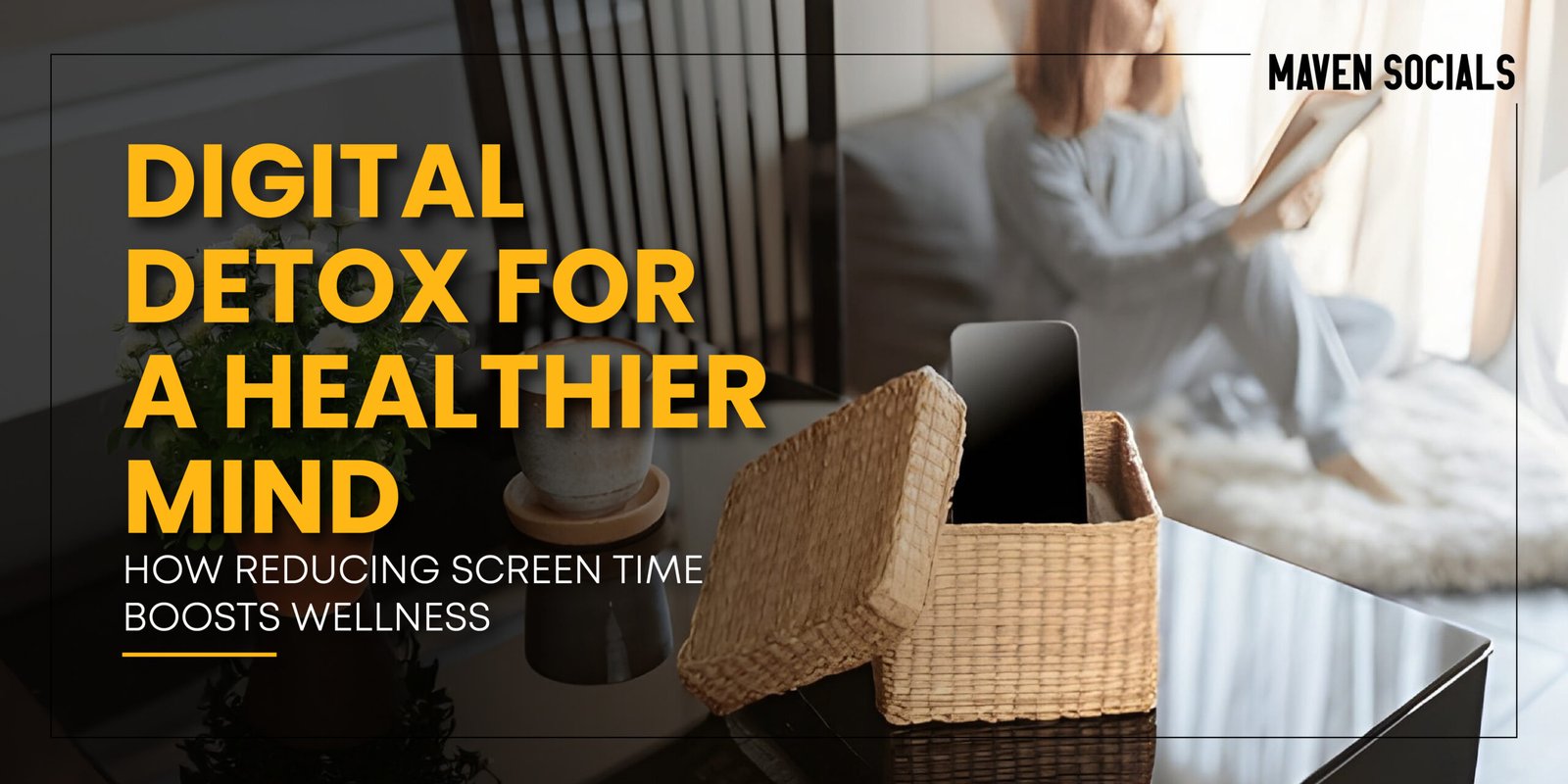In today’s fast-paced digital age, screens dominate nearly every aspect of our lives. From smartphones and tablets to laptops and TVs, we are constantly connected—scrolling, streaming, messaging, and multitasking. While technology brings convenience, communication, and entertainment, excessive screen time comes at a cost, often impacting our mental, emotional, and physical well-being. A growing body of research suggests that taking intentional breaks from digital devices—commonly referred to as In today’s fast-paced digital age, screens dominate nearly every aspect of our lives.
From smartphones and tablets to laptops and TVs, we are constantly connected—scrolling, streaming, messaging, and multitasking. While technology brings convenience, communication, and entertainment, excessive screen time comes at a cost, often impacting our mental, emotional, and physical well-being. A growing body of research suggests that taking intentional breaks from digital devices—commonly referred to as a digital detox—can significantly enhance overall wellness.
Understanding the Need for a Digital Detox
Modern lifestyles revolve around technology. According to recent studies, adults spend an average of 7-10 hours per day on digital devices, while teenagers often exceed this. Extended screen exposure can lead to mental fatigue, poor sleep quality, eye strain, and reduced productivity. More critically, constant connectivity fosters stress, anxiety, and social comparison, especially through social media.
A digital detox is a conscious effort to reduce or eliminate screen usage for a specific period. The goal is not to abandon technology entirely but to restore balance, refocus the mind, and reclaim time for more meaningful activities.
How Excessive Screen Time Affects Mental Health
The effects of prolonged screen exposure on the mind are profound:
- Increased Anxiety and Stress: Constant notifications and the pressure to stay updated can trigger stress hormones. Social media amplifies this effect by encouraging comparison and FOMO (fear of missing out).
- Sleep Disruption: Blue light emitted from screens interferes with the production of melatonin, the hormone responsible for regulating sleep cycles. Late-night scrolling can lead to insomnia or poor-quality sleep, affecting mood and cognitive function.
- Reduced Attention Span: Continuous multitasking and rapid information consumption can fragment attention and reduce the brain’s ability to focus deeply on tasks.
- Emotional Exhaustion: Engaging with negative news, debates, or toxic online interactions can drain emotional energy and increase irritability or sadness.
By stepping away from screens, even briefly, we allow our minds to reset, reduce cognitive overload, and improve mental clarity.
Physical Benefits of Reducing Screen Time
Beyond mental health, a digital detox also supports physical wellness:
- Eye Health: Staring at screens for hours can lead to digital eye strain, dry eyes, and blurred vision. A screen break relaxes the eye muscles and reduces discomfort.
- Improved Posture: Extended screen use often contributes to slouching and neck strain (“tech neck”). Reducing screen time encourages movement and better posture.
- Increased Physical Activity: Less time on devices creates opportunities for exercise, outdoor activities, and hobbies that support cardiovascular health and overall fitness.
Strategies for an Effective Digital Detox
Successfully reducing screen time requires intentional strategies. Here are some practical ways to start:
- Set Clear Boundaries: Designate specific times when devices are off-limits, such as during meals, one hour before bed, or first thing in the morning.
- Use Technology Wisely: Leverage apps that track screen time, block distracting notifications, or limit access to social media during certain hours.
- Digital-Free Zones: Create areas at home where devices are not allowed, such as bedrooms or dining areas, to encourage device-free interactions.
- Engage in Offline Activities: Rediscover hobbies like reading, gardening, painting, or walking outdoors. Engaging in creative and physical activities helps recharge the mind.
- Practice Mindfulness: Meditation, yoga, and breathing exercises cultivate awareness and presence, reducing the urge to constantly check devices.
- Gradual Detox: For those heavily reliant on screens, a gradual reduction may work better than abrupt cessation. Start with small periods and increase over time.
Benefits of Digital Detox on Mental Wellness
Reducing screen time can profoundly impact mental health:
- Enhanced Focus and Productivity: Limiting distractions allows for better concentration and deeper engagement with tasks.
- Better Mood and Reduced Anxiety: Disconnecting from social media and constant news feeds reduces comparison and information overload, promoting emotional calm.
- Improved Relationships: Engaging more with people in real life fosters stronger connections, empathy, and communication skills.
- Greater Self-Awareness: Time away from screens provides space for reflection, goal-setting, and understanding personal values and priorities.
The Role of Social Media in Digital Overload
Social media is one of the most addictive aspects of modern technology. While it allows connection, overuse can exacerbate stress, jealousy, and self-doubt. Studies indicate that heavy social media users are more prone to depression and loneliness. A digital detox often involves limiting social media use or taking complete breaks, allowing individuals to regain control over attention and emotional well-being.
Tips for Maintaining a Balanced Digital Life
A one-time detox is helpful, but maintaining balance is key
- Establish a Morning Routine: Start the day without immediately checking emails or social media. Morning mindfulness or exercise sets a positive tone.
- Prioritize Sleep: Keep screens out of the bedroom and use “night mode” settings in the evening to minimize blue light exposure.
- Schedule Screen Breaks: Follow the 20-20-20 rule for eye health—every 20 minutes, look at something 20 feet away for 20 seconds.
- Curate Content: Follow accounts that inspire, educate, or uplift rather than drain energy.
- Reflect Regularly: Take note of how reduced screen time impacts mood, focus, and energy levels. Tracking progress reinforces the benefits.
Digital Detox: Not Just for Adult
While adults face screen overload in professional settings, children and teenagers are equally vulnerable. Overexposure to screens during formative years can affect attention, social skills, and emotional regulation. Encouraging family-wide digital detoxes—like device-free dinners or weekend outings—can promote healthy habits and strengthen familial bonds.
Embracing the Digital Detox Lifestyle
A digital detox is more than a temporary escape from screens; it is a lifestyle choice that prioritizes mental and physical wellness. It teaches mindfulness, self-regulation, and intentional living in a world designed to demand constant attention. The benefits extend beyond mental clarity, improving relationships, creativity, sleep, and overall quality of life.
By consciously reducing screen time, we give ourselves permission to disconnect from digital noise and reconnect with the world around us, nurturing a healthier mind and a more balanced life.
Conclusion
In an era where digital devices dominate our daily routines, a digital detox is essential for maintaining mental, emotional, and physical wellness. Reducing screen time helps lower stress, enhance focus, improve sleep, and foster stronger human connections. Whether it’s a short daily break, a weekend offline, or a complete social media fast, every effort counts. By embracing a digital detox, we invest in the most valuable resource—our own health and well-being.













